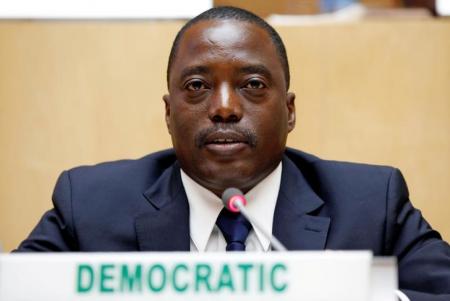
By Aaron Ross
GOMA, Democratic Republic of Congo (Reuters) – Democratic Republic of Congo opposition figure Samy Badibanga was named prime minister on Thursday under a power-sharing deal that allows President Joseph Kabila to stay in office after his term ends next month, the presidency said in a statement.
Congo’s main opposition bloc denounced the choice as a “provocation”, dashing hopes the decision might ease the risk of violence over Kabila’s plan to stay on until at least April 2018.
International powers fear the political impasse could lead to widespread violence in the giant central African nation, where millions died in regional wars between 1996 and 2003 and which has never experienced a peaceful transition of power.
The nomination of Badibanga, who is a member of parliament, to head the new government of national unity came as a surprise as another opposition leader – former Kabila ally Vital Kamerhe – had been widely tipped for the post.
Badibanga was excluded from Congo’s largest opposition party, the Union for Democracy and Social Progress (UDPS), in 2012 along with other MPs for disobeying an order from party president Etienne Tshisekedi to boycott seats in parliament.
Tshisekedi lost the 2011 presidential election to Kabila in a poll that independent observers said was tainted by fraud. He refused to participate in the talks that led to last month’s power-sharing deal, saying they were a pretext to let Kabila cling to power after his final term expires.
As part of the deal struck with part of the opposition, a presidential election scheduled for Nov. 27 to replace Kabila, who has ruled since 2001 and was constitutionally barred from running again, was postponed until at least April 2018, with authorities citing budgetary constraints and delays registering millions of voters.
Martin Fayulu, one of the leaders of the main opposition bloc that boycotted the talks, said Badibanga’s nomination would not affect protests aimed at forcing Kabila to step down when his mandate expires on Dec. 19.
“It’s a useless provocation,” Fayulu told Reuters, denying that Badibanga’s UDPS roots might divide the opposition. “We know exactly what (Kabila) is trying to do.”
Augustin Matata Ponyo, who had served as prime minister since May 2012 and had been credited with overseeing economic stability in the country, Africa’s top copper producer, resigned with his government on Monday to make way for a new cabinet.
The new government will face a growing economic crisis due to the impact of stubbornly low commodity prices. Congo has slashed its 2016 growth forecast from 9 to 4.3 percent and expects annual inflation to near 6 percent, up from less than 1 percent last year.
(Editing by Joe Bavier and Janet Lawrence)